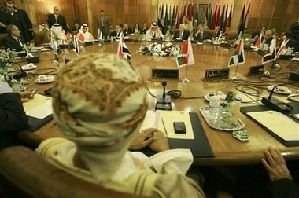Arabs agree to attend talks in Annapolis
Updated: 2007-11-24 11:02
Cairo - Saudi Arabia and other Arab nations grudgingly agreed Friday to attend next week's US-sponsored Mideast peace conference, despite failing to get any guarantee of Israeli concessions.
In a sign of the skepticism, even among close US allies, the Saudi foreign minister cautioned that there would be no public handshakes with Israeli officials at the gathering Tuesday in Annapolis, Md.
 Arab foreign ministers attend a meeting at the Arab League headquarters in Cairo, Egypt, November 23, 2007. The key league meeting, attended by Palestinian Authority president Mahmoud Abbas, is to hammer out a unified Arab position on the upcoming Annapolis conference. [Agencies] |
Still, the Arab League's decision to participate marked a success for the United States, which had pushed hard for regional powerhouse Saudi Arabia to attend the conference.
It was unclear whether another key player, Syria, would show up, even though it was part of the Arab League's collective decision to participate.
Syrian Foreign Minister Walid al-Moallem said his government was waiting to see if the agenda addressed its priority issue -- the return of the Golan Heights, captured by Israel in the 1967 Mideast war. US officials have said Syria would be free to raise any issue it wants.
The meeting will include discussions on a "comprehensive" Arab-Israel peace deal. But it is mainly intended to launch Israeli-Palestinian peace negotiations after a lull of seven years, and Washington had pushed for a strong Arab presence to show support.
Arab leaders made clear they were on board in part to ensure that Palestinian President Mahmoud Abbas does not make any damaging concessions to Israel in any negotiations on a final peace deal. Israel has dangled the possibility of an accord as early as the end of 2008.
Asked if Abbas has a free rein to negotiate a deal, Arab League chief Amr Moussa underlined that Arab countries would not back an agreement deal that did not meet an Arab peace plan calling for a return of all lands Israel seized in the 1967 war.
"I repeat again and again that we are governed by the Arab initiative in all behaviors and ... and in our agreement to end the Arab-Israeli conflict," he told reporters after the foreign ministers of the league's member states decided to go to Annapolis.
Arab countries -- particularly Saudi Arabia, which has no diplomatic relations with Israel -- have worried that the conference would corner them into a high-profile meeting with Israel without securing any commitments about the future shape of a peace deal.
Saudi Foreign Minister Saud al-Faisal said that while he was going to Annapolis, he would not join in any Arab-Israeli handshakes like those stage-managed by US officials at past conferences, such as the one between Yitzhak Rabin and Yasser Arafat in 1993.
|
|
|
||
|
||
|
|
|
|

